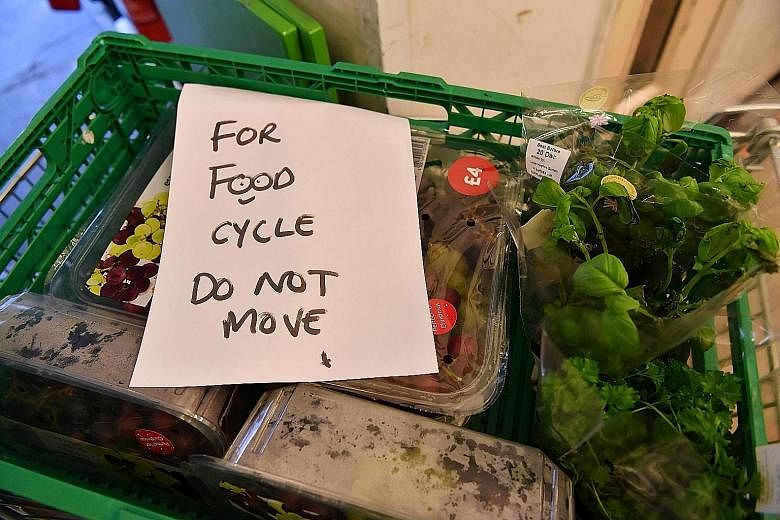ROME • It all started with an espresso. When a homeless man asked pensioner Dino Impagliazzo for one, he thought: "Why not help?"
Soon, he and his wife were making sandwiches for homeless people who hung around one of Rome's train stations.
As word spread, the lines grew longer. Mr Impagliazzo switched to serving hot meals he made at home. Later, he started using the kitchen of a nearby church. "The nuns had a large pot that came in handy."
A decade on, the 86-year-old prepares hot meals for up to 250 migrants and needy people in Rome four days a week, using a tiny fraction of the 1.3 billion tonnes of food waste the world generates each year.
"There is no shortage of food," said the former civil servant, a devout Catholic who credits his faith for his determination to help the poor. "People in need are my brothers - I can't just turn the other way," he told the Thomson Reuters Foundation.
Since 2008, his charity, RomAmor, has prepared all its meals using ingredients nearing their expiry dates, sourced from grocery shops and wholesale suppliers that would otherwise throw them away. RomAmor is among a growing number of enterprises that rescue food headed for the bin, to nourish those in need - a global trend some experts say could be the answer to the mountains of food waste created daily.
"We collect so much stuff that we are even able to help other charities," said Mr Impagliazzo, standing in front of boxes of fruit and vegetables outside the charity's kitchen.
Food left uneaten in Europe could feed a quarter of the 800 million people worldwide who go to bed hungry each night, said the United Nations Food and Agriculture Organisation (FAO).
On Tuesday, European Union lawmakers urged member states to help halve the estimated 88 million tonnes of food wasted across the bloc each year. Under the Sustainable Development Goals agreed on by members in 2015, one target is to halve the amount of food discarded by shops and consumers by 2030.
Mr Impagliazzo's first supplier was baker Carlo Nicoletti, who wondered why a pensioner would buy up to 20 loaves a day. When he learnt that the bread was being used to make sandwiches for the homeless, he offered to give away unsold bread for free at the end of the day.
"I went on to involve other shop owners from the area," said Mr Nicoletti, one of about 300 volunteers working with RomAmor. Meals include a pork-free option to accommodate people of all creeds, and consist of a sandwich, a plate of rice, pasta or soup, and fruit or dessert, depending on availability.
Mr Impagliazzo said the charity gets food from dozens of stores, and the number is rising after a new law opened the way for lower taxes on shops that donate leftovers.
He is also happy that his work can help improve relations between locals and migrants as well.
Rome, like the rest of Italy, has seen a growing influx of migrants in recent years. Last year alone, 181,000 people, mostly from Africa, reached the country via boat, based on government figures.
Lazio, the region where Rome is located, hosts almost 15,000 of the more than 175,000 asylum seekers living in Italian shelters, up from 8,000 in December 2015.
"It's not only about feeding people - it's about getting to know them and trying to help," said Mr Impagliazzo, who oversees all of his charity's work, even collecting food and chopping up vegetables.
On Monday, he braved a cold, wet night to deliver food to about 100 people gathered outside the Ostiense train station. Among the volunteers helping him was Mr Karim Karwan, a 26-year-old Iraqi Kurd, who just days earlier had himself stood in line for a bowl of soup.
The young man said he wanted to lend a hand as he had gone with no food and little water for eight days during the sea crossing from Turkey that brought him to Italy last year.
"I understand what it means to be hungry," said Mr Karwan, adding that volunteering made him feel useful while he waited for his asylum application to be processed.
Mr Impagliazzo said that, by working in the charity kitchen, Mr Karwan was also learning useful skills for the future. He noted how a homeless Italian man who had learnt to cook at RomAmor recently landed a job at a high-end hotel.
Mr Impagliazzo said he was open to anyone willing to be of service, and was helping a Ukrainian man who had had run-ins with police to complete his community service.
"I'd like Rome to become a more humane city," he said.
REUTERS

